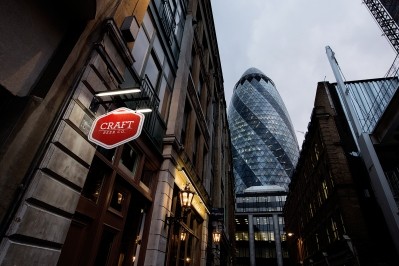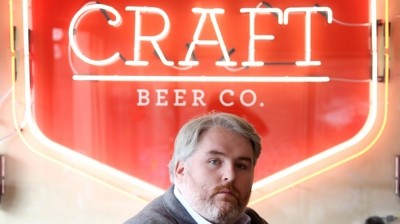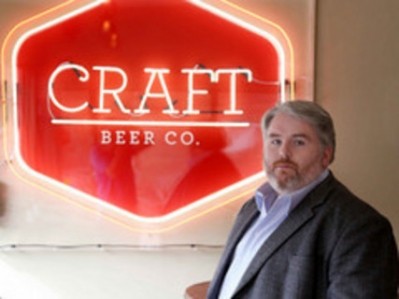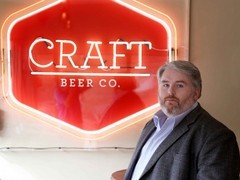The Big Interview: Martin Hayes, Craft Beer Co
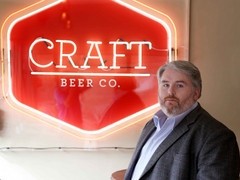
But he’s somewhat perturbed at how the fashionable drinks genre is often mis-understood by consumers and, as he puts it, “purposefully twisted” by some parts of the industry.
“I have debates with people sometimes in the pubs,” Hayes says. “They’ll ask what craft beers we have on. I’ll say I’m not sure what you mean, you’ll have to explain to me. And they’ll say, ‘on keg – craft beers’.”
For the record, cask is a major part of London-based Craft Beer Co’s offer. It accounts for 16 of the 34 taps at its Clerkenwell site, for example. Hayes’ own definition of the notoriously difficult-to-define craft beer category is more simple: “When I started craft beer for me was a term that meant good beer made with love and passion and knowledge by good people.
“It surprises me that people refer these days to craft beer only as keg beer. I understand why a lot of pubs like to only serve keg beer, because it means they don’t really need to train their staff to look after the beer in the cellar. And I understand why there are breweries that only make keg beer because they can charge more for it.
“But I definitely find it strange that there are bars and pubs popping up all over the UK that choose not to sell cask ale.”
Setting the blueprint
It’s a dedication to good beers of many varieties that has seen Craft Beer Co emerge as one of the leading lights of the craft beer bar movement since Hayes, who previously worked for a company that helped design training systems for the railway industry, opened his first pub, Cask Pub and Kitchen in Pimlico, five years ago.
Speaking at the group’s sparkling new unit near Covent Garden, the contrast with the first site when it was acquired couldn’t be starker. Hayes uses words like “run down” and “ugly” to describe the Pimlico venue when he took it on.
“The site was so bad that [the landlord] Greene King applied to give it away to the council as a cultural meeting room for the local population. I got it, we focused on beer and it became increasingly popular; we had a very loyal, dedicated following. People used to say to me, ‘this is great – you should do more, you should roll this out’.”
It wasn’t branded Craft – “we didn’t really talk about craft beer back in ’09” – but Cask Pub Kitchen set the blueprint for what would follow. The intention was to bring together beers from some of the best breweries across the UK and beyond, with dozens of bottled and draught options available for discerning and adventurous drinkers.
“As a small business, we had to stand out from the crowd,” says Hayes. “You can’t wade into battle with huge pub companies on price and other things. It can really only be done on customer service and the choice of drink we were selling. It was just about choosing the battleground and making quality the focus.”
In 2011 Cask Pub and Kitchen was named Pub of the Year by the Publican, which proved a further spur to Hayes’ ambitions. “I just thought we could do better and I thought we’d try a new thing,” he explains. “That’s when I came up with the Craft Beer Company. We found a site in Clerkenwell, and it grew from there. It’s been a bit of a whirlwind.”
The craft of Clerkenwell
Clerkenwell Craft was a “huge success” from day one, and 2012 saw the estate grow to five with openings in Islington, Brixton and its first (and currently only) outside London, in Brighton. Sites in Clapham and finally Covent Garden have since followed.
“The idea was that we would have several places but take one step at a time,” says Hayes. “The idea has always been to build a business we can be proud of and a business where we were sure we could maintain standards. Our reputation was very hard won and we take it very seriously.”
There is, Hayes points out, “no race for sites” or numbers in mind. While he sees plenty of scope to continue to expand in London – the next acquisition this year is expected to be in the capital – the group is keen to spread its wings. Hayes lists Birmingham, Manchester and Birmingham as his top three target cities, with Leeds, Cardiff and Glasgow also mooted.
He certainly does not subscribe to the view that the craft beer movement is primarily a London-centric hipster fad. “Long before the hipsters of east London discovered beer, people in Sheffield and York and lots of the other northern cities were enjoying a pint with their friends.
“We try and make unique, warm, friendly venues with world-class service and world class beer, mixed with wines and spirits. I don’t see this as fashionable; that we’re trying to make hay while the sun shines. I think there always has been and always will be a place for amazing pubs with great products and great people.
“There’s definitely a place for what we do across the UK. There’s a huge hunger for it. I get emails nearly every day asking us to open in one place or another.”
Craft is likely to look at opportunities with major pub companies as it expands. All but one of its pubs are held on free-of-tie pubco leases, and Hayes is positive about his relationships with his pub company landlords, particularly Greene King, which he says has been “truly supportive”.
“But we took on pubs that have failed – that’s the fundamental point,” he adds. “Every pub we’ve taken has been part of a process where we’ve had to make the best offer. You read a lot of horror stories about pub companies and I wouldn’t really have a strong opinion on that. My opinion is, people go into these things with their eyes open.”
Attracting interest
There are just two shareholders in the business, with Hayes the major shareholder and operations director Peter Slezak also holding a stake. Despite attracting interest from investors, the likelihood of an equity sale is remote for the time being at least.
“I don’t really want to sell off any of the business or cede any control,” Hayes insists. “It is tempting to get a pot of gold from somebody and roll out but I’m trying to grow the business in such a way that I would be happy to run it for the rest of my life. If we’d wanted to secure that funding, then it seems to be out there. We certainly get contacted enough. But it’s not on the agenda – that’s not to say that won’t change.”
There’s certainly no plan to mimic BrewDog’s successful Equity for Punks share sale. Hayes admires the high-profile Scottish craft brewer/pub operator – “they are playing a really important role in making people think about beer” – but he stresses that it’s “very different from what we do on every level”, from the ambience of the bars to Craft’s particular focus on service.
Hayes says the formula for the pubs has remained “pretty much the same” since day one, although more recently there’s been an extra focus on food with the addition of burger operator Forty Burgers taking kitchen residencies at its Islington, Clapham and Covent Garden venues. It’s “more likely than not” that the concept will be rolled out to more sites.
However, Hayes says food was “never a massive part of the offer” at Craft, with snack options such as pork pies and cheese platters being more of a staple. “I would always prefer to run a pub that didn’t have food, to be honest,” he points out.
“I took seriously that we were trying to sell the best beer you could find anywhere in the world and I wouldn’t want to have a food offer that didn’t match that. It’s about having integrity with everything we do. I wouldn’t want to have all these beers and wines and spirits and then just bang in a pizza oven.”
What else does the future hold? Interestingly, in what would mark a major departure for the group, Hayes expresses a desire to open a standalone brewery. “If we found the right place we would do it sooner [rather than later],” he says. “We wouldn’t just be trying to put liquid into our own pubs. We wouldn’t be doing it just to make a house lager. We would be doing it to make really unusual beers that could stand next to the best.”
Such bold ambitions show that Hayes is clearly optimistic about the future of the business, which has been buoyed by a recent strong trading performance – year-on-year sales at the company grew by 18% between April and June.
Mixed feelings
More generally, what are his predictions for the craft beer movement over the coming years? He has mixed feeling about recent moves by major pub operators to jump on the craft bandwagon. On the one hand, it “muddies the waters” about what is meant by the term and allows for the emergence of “slightly fake offers”, with groups peddling so-called craft brands that don’t fit his preferred definition of the genre.
“On the flip side, anything that makes people think about beer, makes them think about what they are drinking, will eventually find them through our doors, and I’m confident that if they come through our doors we’ll retain their custom.
“What will Craft mean in 10 years? I don’t know,” Hayes adds. “If you look at the American craft-beer market, it is still booming and it’s booming alongside Budweiser launching beers under different names on a regular basis to try and buy into that.
“The British have a love affair with pubs and with beer and I don’t see that changing anytime soon. I think there will always be a place for great pubs, and great pubs for me are why I’m in this business and why I started this business.
“An amazing selection of drinks matched by amazing service in a warm, cosy, friendly environment – I think that will definitely still be welcome and wanted in 10 years. Whether everyone will still be talking about craft beer, I don’t know.”
